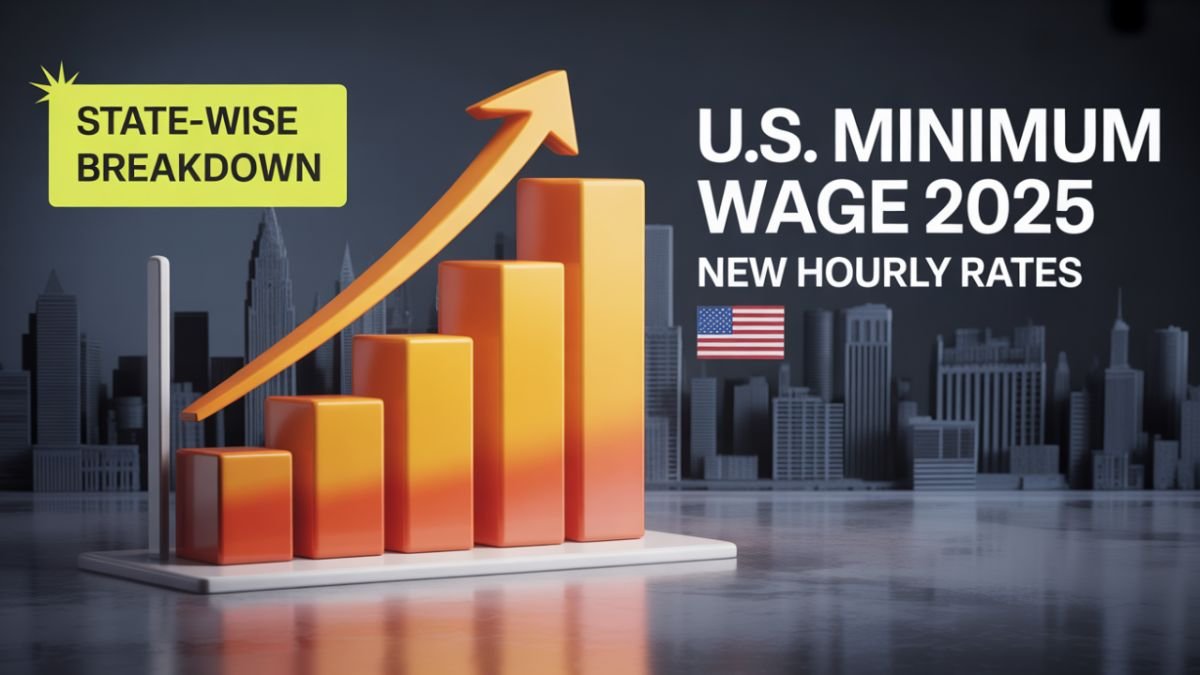The minimum wage in the United States has forever been an issue in discussion. With an ever-changing economy, inflation, an increase in the prices and living costs, and the challenges confronting workers, the United States is undertaking wage reform in 2025. The effect of such reforms will reflect right into the earnings, livelihood, and day-to-day dealings of millions of residents in America.
The announcement of the U.S. minimum wage increase for 2025, made by the federal government on November 10, 2024, was a mega reform going to occur both federally and within the states. Following this reform, along with the updating of pay structures in many states, higher wages are expected to be enjoyed by millions of employees in numerous sectors.
This article will cover the new minimum wage structure, statewise rates, eligibility, reasons, impacts, and updates by government customs in 2025.
Why is the minimum wage being increased in 2025?
There are several key reasons behind the 2025 wage increase, the most important of which are
Linking Wages to Inflation
Many US states have linked their minimum wage rates to the CPI (Consumer Price Index). As inflation increases, wages increase proportionately.
The aim is to ensure that workers’ real incomes are not reduced by inflation.
Scheduled Wage Increases
Certain states, such as California, Connecticut, and New York, follow a predetermined schedule for the raising of wages. This particular increase will take effect in 2025.
Local Wage Laws
Cities like Seattle, Denver, and San Francisco have increased their local minimum wage rates based on the living wage calculation.
For all these reasons, extensive changes have been made to the minimum wage in 2025 to provide relief to workers amid rising inflation and expenses.
How will this change affect workers and employers?
Impact on Workers
- Employees who previously received low wages will see their hourly earnings increase.
- States that increasing wages based on the CPI can expect wage increases in the coming years as well.
- Workers in the service sector, retail, food service, caregiving, and manufacturing sectors will directly benefit.
Impact on Employers
- All employers will be required to update their payroll systems to reflect the new wage rates.
- Non-compliance with wage laws could result in heavy fines.
- Pay rates will also need to be updated for tipped workers.
- Companies will be required to update new posters, documents, and internal records.
State-Wise Minimum Wage for 2025—Key Highlights
The minimum wage (general workforce) rates for some major states that will be implemented in 2025 are given below:
| State | 2025 Minimum Wage | Notes |
|---|---|---|
| California | $16.50/hr | Effective from January 1, 2025 |
| Colorado | $14.81/hr | CPI-based increase |
| Connecticut | $16.35/hr | Updated for 2025 |
| Arizona | $14.70/hr | Inflation-based increase |
| Washington | $16.66/hr | Among the highest rates in the U.S. |
| District of Columbia | $17.95/hr | Effective from July 1, 2025 |
| Florida | $13.00 → $14.00 | Automatic increase on September 30, 2025 |
| Alaska | $13.00/hr | Effective from July 1, 2025 |
Many states have achieved the $15 per hour wage target, while some are still progressing towards it.
Who is benefiting from the U.S. minimum wage increase?
The new pay rates specifically affect employees in the following sectors
Retail and Supermarket Workers
- Cashiers
- Store Associates
- Stock Manager
Food Service Sector
- Restaurant Servers
- Kitchen Staff
- Cafeteria Staff
Hotel and Hospitality Sector
- Housekeeping
- Front-Desk Staff
- Room Service Staff
Healthcare and Nursing Workers
- Nursing Home Staff
- Caregivers
- Medical Assistants
Warehouse and Shipping Sector
- Packaging Workers
- Cleaning Workers
- Transport/Delivery Staff
This increase will provide relief to millions of employees in all these sectors who face low wages, long hours, and high workloads.
U.S. Main Economic Reasons Behind Raising the Minimum Wage
Rapid Rise in the Cost of Living
- Average rent in the US has increased by 40% over the past 10 years.
- Food prices have increased by 25% compared to 2020.
- Healthcare spending has increased by 15–20%
Large Gap Between Wages and Expenses
- Wages were not rising as fast as inflation.
- This left millions of families facing debt and financial stress.
Pressure from Labor Unions
- Many unions and labor organizations in the US have repeatedly demanded that the government:
- The wage structure should be in line with inflation.
Efforts to Reduce Poverty and Inequality
- The purpose of wage increases is to reduce the poverty rate, allowing the working class to live a more stable life.
- New Government Announcement: Federal Minimum Wage in 2025—$10.50/hour
- The government has confirmed that the new federal minimum wage of $10.50/hour will take effect on November 10, 2025.
- This rate is approximately 45% higher than the previous $7.25.
- Although this rate already ranges from $12 to $17 in many states, this move to the federal level is considered a major change.
What does this change mean for the US economy?
Positive Impacts
- Workers’ Purchasing Power Will Increase
- Poverty Levels Will Decrease
- Demand in Local Markets Will Increase
- Consumer Spending Will Increase
Potential Challenges
- Additional Burden on Small Businesses
- Some Companies May Reduce Employee Numbers to Reduce Costs
- Prices May Rise in Certain Sectors
Nevertheless, economic experts believe this change is a “necessary reform” for the US working population.
Conclusion
The U.S. Minimum Wage 2025 is one of the important reforms being implemented in the interest of workers in the US. Inflation, rising rents, expensive healthcare costs, and other daily needs have exacerbated the economic challenges faced by American workers. This wage increase will provide a significant ray of relief for millions of workers.
As this offers a greater economic strength to the workforce, the employers, too, will have to configure their work structures in light of the new laws the 2025 wage regiments spell higher measures of fair pay and worker protection in the US since, really, some changes are being made.
FAQs
Q1. What is the new federal minimum wage in 2025?
A. The updated federal minimum wage for 2025 is proposed at $10.50 per hour, replacing the old rate of $7.25.
Q2. Do all U.S. states follow the same minimum wage?
A. No, each state sets its own rate. Many states have higher minimum wages than the federal level for 2025.
Q3. When will the new minimum wage rates take effect?
A. Most state updates will begin on January 1, 2025, while some federal and local changes take effect on November 2, 2025.



